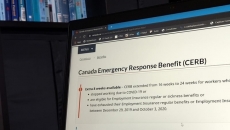OTTAWA - Infectious disease experts are at odds over how valuable it is to randomly test travellers arriving in Canada for COVID-19, as the federal government relaunched its mandatory testing program.
The government put a pause on random testing at airports in June as long customs delays caused chaos at Canada's airports, but relaunched the program on Tuesday at four major airports: Toronto, Calgary, Vancouver and Montreal.
Random tests for vaccinated travellers at the land border have continued all the while.
Randomly selected air travellers at those four airports must now report to off-site locations to be tested for COVID-19 or pick up a self-swab kit.
"Resuming mandatory random testing outside of airports will allow the Government of Canada to maintain its ability to quickly respond to new variants of concern, or changes to the epidemiological situation, while helping alleviate congestion issues in airports," Canada's transport, tourism, health and public safety ministers said in a joint statement Wednesday.
The Public Health Agency of Canada couldn't provide information Wednesday about how much the off-site tests cost compared to the previous iteration of the program.
PHAC is billed on a per-test basis, and the model has changed since the tests were moved outside of airports, the agency said in a statement.
A comparative analysis is expected in a few months, once the invoices have come in.
In December, the government awarded contracts worth up to $631 million to carry out testing and other screening services and the costs have only climbed from there.
Dr. Theresa Tam, the chief public health officer, has called random tests an "early warning system" for new variants of COVID-19 as they enter Canada.
The government posts the data online so the public can see which variants and subvariants are gaining ground among travellers coming into the country.
Roughly one in 15 people who flew into Canada was either randomly selected for a test or needed one because they were unvaccinated between April and June, PHAC data shows.
Of those who were considered fully vaccinated, about 3.2 per cent tested positive.
Infectious disease physician Dr. Zain Chagla says there are more efficient ways to watch for variants
"There's lots of other ways to obtain that information without necessarily the cost and inconvenience to travellers to deal with it," he said in an interview.
"The added expense of millions of dollars in airport testing and land border testing is probably not returning the investment we want in terms of doing that monitoring of variants coming into Canada."
At the beginning of the pandemic, the government assembled a team of experts to weigh in on the optimal use of COVID-19 tests, including in long-term care facilities, in people's homes and at the border.
The group of 12 health policy and infectious disease specialists has not met since April 2021.
In their report on the border published the following May, the panel recommended the government continue to monitor for variants of concern. It's particularly important when variants prove more resistance to vaccines, the experts said.
"This screening will provide a surveillance tool to monitor for novel or emerging variants of concern. Additional short-term measures may be necessary as and when new emerging variants of concern are identified in Canada or internationally," the report reads.
But they also warned that Canadians will be more likely to adhere to the rules if they avoid creating unreasonable delays.
Chagla suggests the government at look at sequencing airport wastewater to look for new offshoots of the coronavirus, which has proven to be a helpful way to monitor the spread in communities.
The program makes even less sense at the land border, he said. The Centers for Disease Control and Prevention releases data about variants of concern in the United States, he said, and there's no need for Canada to spend money duplicating those efforts, particularly when it comes to people from border towns who cross between the two countries regularly.
"Why are we recreating a system at the expense of travellers?" Chagla said.





